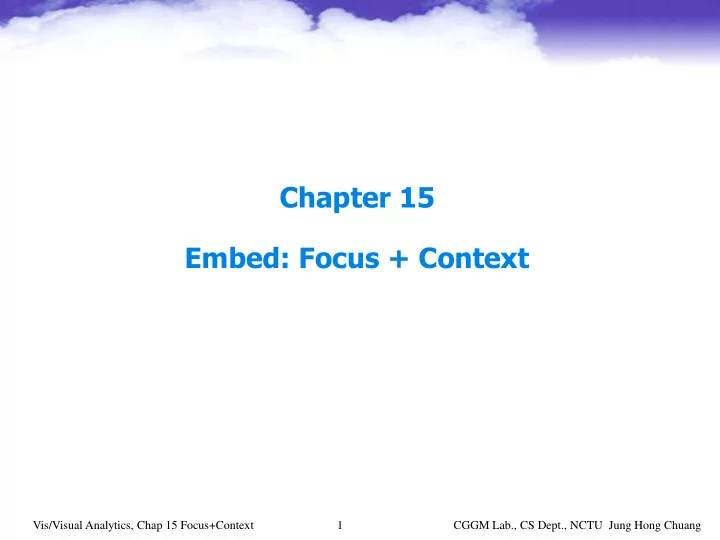

Chapter 15 Embed: Focus + Context Vis/Visual Analytics, Chap 15 Focus+Context 1 CGGM Lab., CS Dept., NCTU Jung Hong Chuang
The Big Picture • Focus+context idiom – To embed detailed information about a select set – the focus – within a single view that also contains overview information – context – To elide items • Some items are filtered out completely while others are summarized using dynamic aggregation for context; only the focus items are shown in detail – Superimpose layers • A local region of focus information can be moved aginst the background layer of context information – Distort the geometry • Context regions are compressed to make room for magnified focus region Vis/Visual Analytics, Chap 15 Focus+Context 2 CGGM Lab., CS Dept., NCTU Jung Hong Chuang
The Big Picture Vis/Visual Analytics, Chap 15 Focus+Context 3 CGGM Lab., CS Dept., NCTU Jung Hong Chuang
Why embed? • To mitigate the potential for disorientation that comes with navigation – Geometric zooming requires to remember one’s navigation history – Focus+context attempt to support orientation • By providing contextual information that acts as recognizable landmarks – An example of nonliteral navigation, similar to semantic zooming Vis/Visual Analytics, Chap 15 Focus+Context 4 CGGM Lab., CS Dept., NCTU Jung Hong Chuang
Why embed? • Focus+context is a synthesis of visual encoding and interaction – Interaction • Focus set changes dynamically as the user interacts with the system – Indirect control • Focus set is inferred via the combination of user’s navigation choice and the inherent structure of dataset Vis/Visual Analytics, Chap 15 Focus+Context 5 CGGM Lab., CS Dept., NCTU Jung Hong Chuang
Elide • Three set of items – Some items are omitted from the view completely, via dynamic filtering. – Other items are summarized using dynamic aggregation for the context – Only the focus items are shown in detail • Degree of interest (DOI) function DOI=I(x)-D(x,y) • I: interest function • D: distance, either semantic or spatial • x: location of an item; y: current focus point – The function is used based on threshold value Vis/Visual Analytics, Chap 15 Focus+Context 6 CGGM Lab., CS Dept., NCTU Jung Hong Chuang
Elide DOITrees Revisited uses elision to show multiple focus nodes within context in a 600,000 node tree. Vis/Visual Analytics, Chap 15 Focus+Context 7 CGGM Lab., CS Dept., NCTU Jung Hong Chuang
Elide Vis/Visual Analytics, Chap 15 Focus+Context 8 CGGM Lab., CS Dept., NCTU Jung Hong Chuang
Superimpose • Superimpose – Background layer: context – Foreground: focus set • Limited to local region • Example – Toolglass and magic lenses Vis/Visual Analytics, Chap 15 Focus+Context 9 CGGM Lab., CS Dept., NCTU Jung Hong Chuang
Superimpose The Toolglass and Magic Lenses idiom provides focus and context through a superimposed local layer: the see-through lens color codes the patchwork sphere with Gaussian curvature information and provides a numeric value for the point at the center. Vis/Visual Analytics, Chap 15 Focus+Context 10 CGGM Lab., CS Dept., NCTU Jung Hong Chuang
Distort • Use geometric distortion of the contextual regions to make room for the details in the focus regions • Design choices – # of focus regions – Shape of focus • Radial, rectangular, or completely arbitrary shape – Extent of the focus • Global or local – Interaction metaphor Vis/Visual Analytics, Chap 15 Focus+Context 11 CGGM Lab., CS Dept., NCTU Jung Hong Chuang
Distort • Fisheye Focus+context with interactive fisheye lens, with poker player dataset. (a) Scatterplot showing correlation between two strategies. (b) Dense matrix view showing correlation between a specific complex strategy and the player's winning rate, encoded by color. Vis/Visual Analytics, Chap 15 Focus+Context 12 CGGM Lab., CS Dept., NCTU Jung Hong Chuang
Distort • Fisheye Vis/Visual Analytics, Chap 15 Focus+Context 13 CGGM Lab., CS Dept., NCTU Jung Hong Chuang
Distort • Nonlinear magnification fields – Multiple foci – Arbitrary magnification levels – Arbitrary magnification shape Vis/Visual Analytics, Chap 15 Focus+Context 14 CGGM Lab., CS Dept., NCTU Jung Hong Chuang
Distort Nonlinear magnification fields General frameworks calculate the magnification and minimization fields needed to achieve desired transformations in the image. (a) Desired transformations. (b) Calculated magnification fields. Vis/Visual Analytics, Chap 15 Focus+Context 15 CGGM Lab., CS Dept., NCTU Jung Hong Chuang
Distort Nonlinear magnification fields Vis/Visual Analytics, Chap 15 Focus+Context 16 CGGM Lab., CS Dept., NCTU Jung Hong Chuang
Recommend
More recommend